
50 Cent embodies all of the necessary characteristics of a comic book superhero, complete with the perfect alter ego which launched him into hip-hop and corporate superstardom. A vulnerable impoverished kid, Curtis Jackson was raised by his grandparents while longing for his deceased mother, and later nearly succumbing to the streets of South Jamaica, Queens after being gunned down in 2000 as he was on the cusp of a promising recording career. When Curtis Jackson fell on that day, what eventually emerged was the diesel, tattooed rap mogul with the moniker “50 Cent” and a branding empire that many MBA graduates would envy. Going into our meeting I had no idea who to expect or what kind of person 50 Cent really was.
The first thing I said to him after he greeted me with a warm hug was, “Should I call you Curtis?” to which he quietly replied, “That’s fine,” as he looked down at his hands for a beat and then back up at me with a sheepish smile spreading across his face. At that moment what rushed through my mind was the fleeting thought, “Is it my imagination, or am I making this guy a bit nervous?” In that instant my own butterflies were settled. That initial blind date atmosphere that interviews can often resemble had instantly dissipated.
A soft expression emanates from 50 Cent’s eyes. Less imposing up close, eye contact is not enough for him, he’s touchy feely, leaning in towards me and grabbing my arm or my leg after he says something he deems important in an effort to drive his point home with me. Many of his sentences were punctuated with a cute nudge to my right side followed by a search for my approval. Dressed in a worn-in leather jacket and black baseball cap with no designer labels or bling in sight, suddenly the gold and diamond ring on my right finger seemed a bit out of place. I anticipated an exchange that would be tight, to the point and filled with personal bravado from him. What I got instead was a laid back and open conversation. I urged 50 Cent to contemplate his relationships, fears, successes, family and the life he’s created for himself.
On a sunny mid-October afternoon perched on a balcony atop midtown Manhattan, my job was to challenge him on the art form that made him famous, and some of the societal sentiments that accompany, and often stigmatize his genre of rhetorically graphic rap music. Though at several points he protested strongly that I have a low threshold for graphic language and suggested I steer clear of “R Rated films,” I took the jibing like a good sport because he gave me so much more in exchange. I did what I had to do to push 50 Cent slightly outside of his comfort zone, coaxing him to go to a deeper place; perhaps coaxing him into the headspace of Curtis Jackson.
50 Cent has a demeanor that shifts back and forth between childlike curiosity and shrewd business acumen. There is an interesting contrast apparent in listening to him speak. With an admitted lack of formal education, 50 Cent’s speech betrays that fact while his thoughts are the thoughts of an intellectual and a philosopher. Listening to 50 Cent talk about his lyrics is like listening to a brilliant piece of music being filtered through a less than perfectly constructed old school record player. It requires a trained ear, but the music coming through it is no less brilliant.
PR.com (Allison Kugel): What are the events in your life that have defined you?
50 Cent (Curtis Jackson): My son, my mom passing, the lifestyle I took on following that, and then the decision to write music for a living.
PR.com: Why did you make the lifestyle decisions you made after your mother passed away?
50 Cent (Curtis Jackson): The temptations… not just temptations, but wanting that life. My mom had me when she was fifteen. And teenage pregnancy wasn’t as common as it is now, and now they have programs for children that are having children. So [for her] working wasn’t an option. It was welfare or to hustle. Whenever I made reference to my mom or would think of my mom I would just think of everything that was positive and good in my life. So that was my motivation. Every time I would see her it was on Christmas, and she would come with something for me. When she went away there was nothing coming. I went to live with my grandparents. They had nine children and she was the [only] one of my grandparent’s nine children that passed away, so it was kind of easy for me to get lost in the shuffle. It was also an easy way for me to find my way into that lifestyle because people that I would see that had nice things were all from my mom’s life. Back then my name wasn’t even Curtis. It was “Sabrina’s baby (referring to his late mother).” So they knew me through my mom. And they’d be wondering, “Why do you look like that?” or “Why do your shoes look like that?” not realizing that there was no one really there to provide for me at that point. My grandparents are really traditional and old fashioned. My grandfather’s job was the largest asset in our family. He went to work and [my grandmother] stayed home to take care of the kids. And on his salary…
PR.com: It wasn’t easy.
50 Cent (Curtis Jackson): Yeah.
PR.com: I have one son. I know (laughs). And, by the way my son’s name is Marcus.
50 Cent (Curtis Jackson): My son’s name is Marquise!

PR.com: Yes, I know. And my mother actually went to your high school, Andrew Jackson. But she’s a sixty year old Jewish woman.
50 Cent (Curtis Jackson): Laughs.
PR.com: Tell me about your book, The 50th Law?
50 Cent (Curtis Jackson): I actually had an opportunity to read Robert Greene’s work, The 48 Laws of Power, The 33 Strategies of War and The Art of Seduction. After I read those projects I was interested in seeing who he was. Because I established G-Unit Books with Simon and Schuster and MTV Pocketbooks, I was able to track Robert down. I just wanted to meet him. If you saw us physically you would see a complete odd couple, but when we actually talked we shared so many similar views from a business perspective on how you should conduct yourself and do things, and we decided to make the book. We actually worked on that project since 2006.
PR.com: What is the 50th Law?
50 Cent (Curtis Jackson): It’s about fear. To give you a concept or an idea of how it relates to someone in the normal or average space, did you go to college?
PR.com: Yes.
50 Cent (Curtis Jackson): So there’s points where you’re in a classroom and the professor asks you a question. Someone actually raises their hand and answers the question that you know the answer to. But when they raised their hand to answer the question, and [you didn’t] it’s because there’s a slight fear of being wrong, and that’s what didn’t allow you to raise your hand and say the answer. To bring it to the workspace, I’ll be in a conference room or a staff meetings when everyone is there, and people are safe. They stay in a space where if they don’t have to answer a question and you’re not directing it directly to them they’re not going to say what they think. They’re just going to sit there and be safe. They never create the value that they actually have based on information they’ve attained, because they don’t let it be known that they have it. So those people, it slows down their progress.
PR.com: What were you afraid of that you’ve overcome, since everyone has some fear?
50 Cent (Curtis Jackson): Let me tell you one thing I’m afraid of. I see the best business people in the world, right? The best businessmen you could make reference to. A lot of them that I know, they make really great deals and the worst deal that they’ve made is committing to the wrong woman. And they pay.
PR.com: Did that ever happen to you?
50 Cent (Curtis Jackson): No, but 50% of their overall accomplishments is a hell of a loss.
PR.com: How do you judge success? Do you judge it by having a balanced life where everything is working, or just by financial gain?
50 Cent (Curtis Jackson): Because I don’t have that other portion in life that you would say is balanced, it’s the business portion.
PR.com: Do you feel like your life won’t be complete until you have a spiritual center, a romantic partner or whatever else a person needs?
50 Cent (Curtis Jackson): I see what you’re saying. I’ve developed trust issues. I have to be friends with someone long enough for me to identify what the defects in their character are, and so they know what I’m gonna do and what my habits are, and accept them or be aware of them. Then we can try to work on them if they love me. But it will be a time period. It won’t be something that just happens.
PR.com: What I’ve learned is that sometimes staying together with someone is as simple as not leaving them, because everyone has issues and all relationships have their ups and downs.
50 Cent (Curtis Jackson): But we put our best foot forward first, so when you meet a girl you have no idea who she is. That’s why you don’t see anything wrong with her. She still hasn’t offered those other things that you will find later in an actual relationship that you’ll find as an issue later on, and vice versa. Looking at males, if you meet a guy and he seems perfect, you’re gonna be looking at him like he’s a fucking dream! Like, “Where’d he come from?!” (Laughs). It will take a while before you start to see things, and you’ll be like, “Whoa! Why did you do that?” You know?
PR.com: I think the most important thing is if you can tell that somebody cares about you, for you and that they’re not interested in what you can give them.
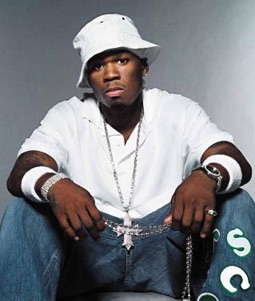
50 Cent (Curtis Jackson): But I’ve asked guys who grew up under the same circumstances that I grew up in, and let’s take professional athletes for example. A lot of them come from real tough backgrounds, also. They come from not having, and they develop a passion for the sport and over time become professional ball players. And they get a chance to see how a woman from where they’re from is affected by finances. Away from your physical attributes, stability is attractive, period. No matter who she is, she’s gonna enjoy that part, eventually. So you’re seeing a specific demographic affected by it, because the women that I grew up around, the guys that had the nicer cars had nicer looking girls in the passenger seat. It was a law, pretty much.
PR.com: Is that why you wrote the song Baby By Me on the new album?
50 Cent (Curtis Jackson): When I wrote Baby By Me, I thought, in general, if the relationship doesn’t go right I literally will pay a million dollars before the child is twenty-one. So that line made sense to say, based on the financial space I’ve achieved.
PR.com: Has that been your experience with your son?
50 Cent (Curtis Jackson): I’ve spent way more money on my son.
PR.com: Because you want to…
50 Cent (Curtis Jackson): Yeah, and before I actually had to go to child support. I filed for me to [give] child support. I filed in family court so I could go and they could tell me how much child support to pay, so my son’s mom would have a better understanding of what she’s entitled to. Because she had a sense of entitlement that couldn’t be met based on her being around me. And I’ve known her for about fourteen years. But there’s a point where you can know someone for a long time, and then they wake up someone new.
PR.com: Did they wake up someone new or have they always been that person?
50 Cent (Curtis Jackson): They probably have always been that person but to you it feels like they’re someone new, and that’s probably why the majority of people who get married and then divorced broke up.
PR.com: Tell me about the film that accompanies your new album, Before I Self Destruct. This is your directorial debut…
50 Cent (Curtis Jackson): It’s actually an opposite process [from music]. I’ve been in spaces with directors where they showed me scenes in a film and they wanted artists or musicians to create material to match the mood of that portion of the film. What I did was I wrote the record and I created a synopsis, a one sheet of what I wanted the film to be about. Then I wrote the actual screenplay.
PR.com: Is this a feature length film that will only be sold with the album?
50 Cent (Curtis Jackson): Yeah. I could have sold it separately on the same release date in a different section, like “The album and the DVD!” But I wanted to make sure that everyone got a chance to see it. They’ll see it there and then probably on Showtime.
PR.com: What is the film about and what was it like directing?
50 Cent (Curtis Jackson): My intentions for the film were to show “cause and effect.” Every song is about three minutes before you reach the time when it is changing, as far as a Deejay is concerned in the nightclubs. It’s only enough time for you to create descriptions. Music sets the mood or the tone of what it should feel like and then you say things within the laws of what’s good for songwriting during that timeframe. But then you can’t explain yourself. You can’t explain why it’s that way. So I created a [film] character that had the defects that I had on the record. I offered some things on this record that I haven’t told people about my experiences. It’s almost a prequel to Get Rich Or Die Tryin’. It’s from things that happened prior. The character Clarence in this film, his mom gets killed, but not the same way as my mom. I had to do that in order for the other things to happen accurately and to create the pivotal moment. To give you an example, a song I wrote goes, “Coming up I was confused; my mama kissing a girl; confusion occurs; coming up in a cold world.” When I actually wrote that song (Love It Or Hate It), I was reflecting. My mom passed when I was eight, so I’m writing from a seven year old child’s perspective. You don’t see a seven year old child seeing it when I’m saying it. You just hear, “Coming up I was confused…” From a child’s perspective it was like, “What’s going on here? Maybe mommy is just really close to her girlfriend.” You don’t know what’s going on at seven (laughs). But you grow up and then people can tell you what was actually [happening], and you’re like, “I thought that was a little more than the usual friends, but…”
PR.com: Laughs.

50 Cent (Curtis Jackson): That was crazy (laughs), but you know how it goes. There’s a song called Mechanic where I wrote, “My mom told a baby boy the Lord gonna bless us; then dope bought us shit that food stamps couldn’t get us; and they don’t understand we was just trying to make it; but where I’m from when you want shit you gotta take it; I’m a Trojan in war I get it done like Achilles.” What I was saying at that point was, when a parent is teaching a child religion and then the pressures of having to financially survive show up and they make decisions that don’t coincide with what their religious beliefs are, a child can interpret the things that you brought in as gifts or those things that you had that were nice as if it was the Lord blessing us; thank you God! And it’s coming from drug money. So there’s a lot of interesting things that I wrote on the record that I’m not sure it translated completely. When I wrote 21 Questions I wrote, “I love you like a fat kid loves cake,” and people smile at me in the crowd, so I know that they’re envisioning a fat kid eating cake when they’re smiling. But what I was trying to say is, “I love you, but too much of you is no good for me.”
PR.com: It’s a funny line (laughs).
50 Cent (Curtis Jackson): As soon as you hear it you see a fat kid, you see the cake…
PR.com: And you see a fat kid devouring cake…
50 Cent (Curtis Jackson): Right. And it’s just interesting. Words are amazing!
PR.com: I think a lot of what you write is misinterpreted.
50 Cent (Curtis Jackson): I guess most artists are misinterpreted. You don’t know what they’re thinking. A friend of mine took me to this place, he got me dressed. I got my suit on, I was sharp, I got my new shoes on. We go out to this spot and we’re supposed to go see some art. We go and it looked like this guy spilled some paint on a whole book of Yellow Pages. It looked like he just spilled paint. And I asked him how much it was for one of the sheets, and I think he said something like one hundred thousand dollars. I forgot the artist’s name. Val Kilmer actually took me.
PR.com: Anything can be considered art, right? Where do you draw the line?
50 Cent (Curtis Jackson): Nobody’s gonna pay a million dollars for me and you scribbling. They pick who to pay. “Who’s scribbling are we gonna pay for?” Once they die, you’re like, “Oh, wow. This is amazing!” Or, “So what do you see?”
PR.com: And, “What was he thinking when he scribbled that?” Like, don’t you ever wonder why people want your autograph?
50 Cent (Curtis Jackson): I do, but I think it’s just something that says that they met you. That physically, I was in the same space with you.
PR.com: Then they put it on Ebay and make a killing.
50 Cent (Curtis Jackson): Oh, yeah, yeah. But they have to find someone else who wants it (laughs). I’ll sign my jackets, my hats and stuff. I’ll go up on stage and I’ll throw them into the crowd at different points, to give the audience memorabilia from when I wore it during an actual show, and I’ll put the date and where the show was at.
PR.com: I have to ask you, what is your general opinion of women? The impression you give from a distance is that it’s not good. You’re a sweetheart, but from what people see in the media it doesn’t seem like you think very highly of women, generally speaking.
50 Cent (Curtis Jackson): That’s not true. What they misinterpret is, when you choose to write the harsh realties you write [about] different classes. If I took you downstairs there’s a store that says “for adults,” and me and you are both adults, right?
PR.com: Yes, I passed that store.
50 Cent (Curtis Jackson): That store has entertainment in it. Now check this out… the women that we were just talking about, it isn’t the same women that you were making reference to. What I’m trying to say to you is that, that is a different class of woman that’s in that adult entertainment space.
PR.com: The women who are in those movies…
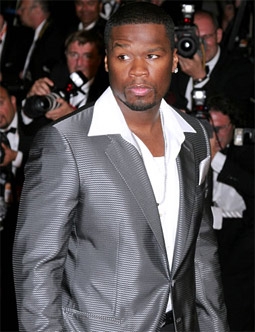
50 Cent (Curtis Jackson): Right. So they’re on that tape and they get paid a thousand dollars to perform whatever you would feel is intimate.
PR.com: To have sex…
50 Cent (Curtis Jackson): Right, in every way possible! And guess what? You’re gonna find every kind of shape and from a woman’s perspective you could point and find every kind of woman that you think physically meets the description of attractive. You could look and say, “She looks nice.” From a female perspective, you will find a representation of beauty in every creed. We find African American women, white women, Brazilian women, Hawaiian women. There’s actually categories. You could just go and ask for it. Whatever you want, you could find it. You know what these women are representation of? These women are representation of whores. They fuck for a thousand dollars with no royalties, in the film that you’re watching.
PR.com: What about the guy who’s in the film who is making even less money?
50 Cent (Curtis Jackson): Them too. But socially it’s something different from a male perspective, the lust factor that [men have] for women. Women are beautiful. They’re better than men to look at. So there would probably be a clear statement to say that men lust after women more than women lust for men.
PR.com: Those are the women you’re talking about when you’re rapping about women?
50 Cent (Curtis Jackson): You’re making representation to a different class of woman at different points on the record. The average woman doesn’t make the separation. She either hears something that she thinks is disrespectful, or she doesn’t know that it wasn’t for her. A lot of times the women that do enjoy the art form are no longer sensitive to those statements or things being said in that manner, because they feel like that doesn’t apply to them, and they do acknowledge that those women are out there. If you hear a derogatory statement within the music, that artist is probably making reference to something he’s experienced that made him feel like that woman was that kind of woman.
PR.com: In my adolescence I remember being angry because my father was a strong influence on me growing up, and I grew up around my brothers and male cousins and I wanted to be like them. When I heard [lyrics] like that I felt like it was saying I can’t be like them because I’m a second class citizen as a woman.
50 Cent (Curtis Jackson): What?! Second class citizen?! There’s standards from a male perspective that are different from women. Your brother, if he sleeps with four women in a ten or twelve block radius while he’s a single male there’s absolutely nothing wrong with that. If you applied the same standards to you, within the neighborhood you would have an aura of a whore. Because they would look at you like they know four men had been intimate with you within that twelve block radius.
PR.com: So you’re saying women are held to a higher standard.
50 Cent (Curtis Jackson): Absolutely! This is why the Queen stands (laughs), so everyone can admire her beauty! She’s more beautiful. The King just sits down and he’s fat under his robe. People will respect him and fear him. But she stands so they can see her whole body, and so they can see all of her beauty. It’s not a thing where you consciously say, “Fuck that, and all these bitches is hoes,” and use these statements towards any and everybody that you meet. These are specific terminologies created long before rap to create a description of someone in their behavior. When it falls into the actual art form it feels offensive, and I understand there are different points. Socially you have people that are afraid to hear that. They just aren’t ready to hear it, like it should only happen while someone’s having a fight, in their head. Because if you said, “You bitch!” in the middle of an argument you would understand it, and think it was because he was upset (laughs). As opposed to, you’re hearing it in a record and you’re feeling like he completely thinks I’m a second class citizen.
PR.com: I’ll leave you with one final thought and then we’ll move on. I personally believe that the “B” word is a tool used to de-humanize women. Just something to think about.
He finds it amusing that throughout our conversation I refused to actually say the word “Bitch.”
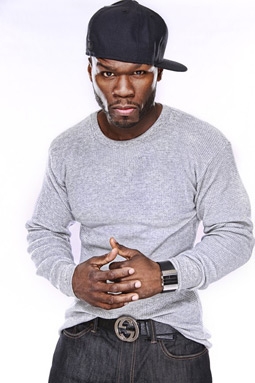
50 Cent (Curtis Jackson): I’ll just say this, the “B” word (laughs) has been utilized by not just men. If your statement was factual and it was created with those intentions, it would be something that only men utilized.
PR.com: Don’t people use derogatory terminology within their own race or religion when they want to put each other down? Isn’t it still wrong?
50 Cent (Curtis Jackson): Has there ever been a point that you’ve [used] the “B” word? You’ve been upset to a point that you call someone the “B” word? Be honest with yourself…
PR.com: Oh God, honestly? I usually use the “C” word (laughs).
50 Cent (Curtis Jackson): Wouldn’t that be an even more vivid description? I’m gonna use c*** from now on. That’s even more aggressive, isn’t it?
PR.com: (Laughs). Hey, I’m a girl. I’m allowed to say it (on rare occasions).
50 Cent (Curtis Jackson): What is the definition of c***?
PR.com: It means vagina.
50 Cent (Curtis Jackson): So what we’re having is a debate in social standards. It’s socially how people are feeling different from different perspectives. Certain films might be out of the question for you.
PR.com: No! That’s not true at all.
50 Cent (Curtis Jackson): But isn’t it consistently utilized there?
PR.com: If you’re watching a movie where someone is smoking a cigarette, the director depicted them smoking a cigarette to show a weakness in their character. That’s a part of the character.
50 Cent (Curtis Jackson): I see what you’re saying, but for entertainment purposes, because music is entertainment, it’s not as high as film because you can’t in your first week bring in 120 million dollars. This is why they place standards on other art forms that they don’t place on films. You see what I’m saying? Walmart won’t sell your dirty CD, but they’ll sell an R rated film that I created based on the dirty CD. And visual and sound is more impressionable than just sound. It just puzzles me because it’s really about how much you can expect in financial returns. The major outline is business, so when you can expect a blockbuster album, let’s call it Get Rich or Die Tryin’, that project would have sexually suggestive things that live in the environment I grew up in. That [album] may do 12 million records and earn the company 120 million dollars. But it takes seven months to get to that point. Meanwhile, a blockbuster film could do it in two days, Saturday and Sunday. So they don’t fuck with that format because of that. And everything that’s in the film is on the record! It’s pieces of the record! With the song itself, with three minutes you only have enough time to create a collage. And there’s no rap records about rape. We would find probably 500,000 scenes in films that have shown rape at different points, because the film writers and the film makers try to capture the reality of life. But those realities are being limited to certain platforms, certain art. And it’s who’s presenting it, also. Hip hop culture is still originated as a black art form. It’s still a black art form but so many different ethnic groups are involved now, because culturally it changed. Now it’s pop culture and so many people consume it, and are into it that’s just become broader.
PR.com: Who are you writing for? When you’re writing and recording music, who are you making the music for, in your mind?
50 Cent (Curtis Jackson): Initially, I wrote music that people could relate to in the environment. My core wants to hear the music for [them]. But if an artist has a specific demographic he’s making music for, how limited is that artist? I just make music for people to appreciate at some point. If you had asked me to make a wish in 2003 it would be that people enjoy my music. That’s it. That’s all I wanted. From there I acquired what comes with being successful as an actual artist, and then assessed the situation and went further into business ventures that allowed me to earn more away from the music than I’ve earned from the actual music. But when you write these different things it’s from exposure. It’s from what you’ve developed a comfort with from things being said around you. You’re using terminologies and descriptions that make you feel like it felt in that environment. A lot of times the artist is revisiting what they’ve experienced until they get it 100%. I never made a remix to my best songs because they were done right to begin with. They were smash hit records. You don’t revisit those records again, you go somewhere else. And no matter how hard you try, when those things have a really strong impression on the general public, you won’t top it in their head.
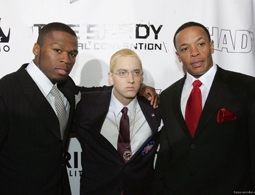
PR.com: You were quoted as saying that “you’re aware of Jay Z and Kanye West, but you don’t care about them.” Who do you care about? Who are your professional role models?
50 Cent (Curtis Jackson): I’m aware of a lot of people. Do I care about them? No. Do they care about me? No. I don’t look up to any of them. I care about Em. I’m sure he has my best interests in mind. What people mistake is because we’re in the same business, and hip hop is the kind of thing… you can’t go to work in hip hop. You can’t go from 9 to 5 and then go home. It’s the kind of thing that you stay aware of consistently what’s going on, what’s working and what’s not working, and who’s doing what. Then from there it’s territories and what you get from working with this person, or where they’re going. These artists are not people that I would call at leisure just to say, “Hey, how are you doing?” They’re not my friends, and I believe because we’re not friends, that they don’t care about what I’m doing either. So I would say openly that I couldn’t care less about what they’re doing.
PR.com: What do you think about Eminem as an artist?
50 Cent (Curtis Jackson): I think Em is Air Jordan. I think Em is Tiger Woods.
PR.com: That’s interesting. He was kind of a pioneer, as a white man doing rap.
50 Cent (Curtis Jackson): There have been other white rappers prior to him have success, but they weren’t as good. So now if you put him against whoever you’re calling your top emcee, there’s a high probability that they get their ass whooped on the track, because he’s that good. You’ve got other people who will not want to see it that way, obviously, for their own reasons. But when you just look at the art and what the decisions were, creatively, you could see someone getting their ass whooped. There’s no way to really gauge who is really your top five artists unless you’re going to gauge it by general public’s response to it. That would be by checking the SoundScan and the sales because even the networks make decisions based on who they like, who does lunch, who does the favor for them when they need the favor or whose company is spending marketing dollars on raising the show production for their actual show. You see what I’m saying? I’m getting trophies because my company’s paying a million dollars on my performance tonight.
PR.com: I know. The awards shows are all so political.
50 Cent (Curtis Jackson): Yeah, all political. So all these different things factor into why people think this is cool and this isn’t, or what’s hot and what’s not.
PR.com: Is rap still an art form that’s rooted in pain and anger, and oppression? Because that’s what it was in the 90s.
50 Cent (Curtis Jackson): It comes from that. The 90s… it’s different now. I think it came from that, initially. A lot of the people who were writing then were coming from tough circumstances coming out of the Bronx when it started in New York.
PR.com: Can you still be effective as a rapper when you’re not the underdog anymore, and when you’re wildly wealthy and successful and you’re not living in that anymore?
50 Cent (Curtis Jackson): Watch me!
PR.com: No, I know, “Watch you.” (Laughs). But do you have to change up how you write?
50 Cent (Curtis Jackson): You’re subjected to different things so you change with your surroundings. So when you say are you able to stay in tune with the actual art form, that’s just being conscious of what’s going on.
PR.com: You recently did a neighborhood concert in your hometown of Jamaica, Queens. What was that like for you?
50 Cent (Curtis Jackson): It wasn’t what I expected. Initially, I expected to do it on August 30th, which was the day that it traditionally happens. And it was postponed. They said that I shouldn’t promote that I was coming into the neighborhood because they feared too big of a crowd. But I don’t understand that, when they have free concerts in Central Park.
PR.com: So it was a security issue…
50 Cent (Curtis Jackson): Yeah, they say it’s a security issue. They’ll go to The New York Post and write a negative article showing where I got shot and write all the way back to the location. [They’ll] show a diagram of the location of where I got shot to the location of where I was actually going to perform. I think that was entertaining for people because they evoked fear in people at that point. See, the possibility versus the probability of something happening is two different things. Possibility, hell yeah something can happen! We’re in the middle of where it happens, but if it’s planned properly and there’s no reason why there could be a lack of security at that point, I don’t see why [the concert] can’t actually happen.
PR.com: How did it go?
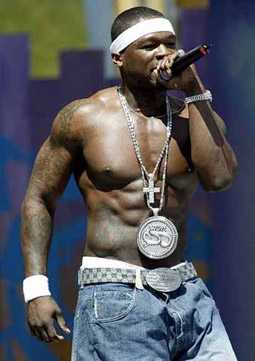
50 Cent (Curtis Jackson): I ended up doing it without anyone being notified that it actually was taking place. It still turned out to be almost five thousand people outside, but they thought it might have been twenty or thirty thousand people if people had a chance to call people and let their friends and other people come out and see the concert. It’s interesting. I just watched community leaders be more divided than the actual community in the process of trying to create it. I watched people be more interested in what I could do for them than in the kids in the community.
PR.com: But what was it like for you, performing for the young people in your old neighborhood?
50 Cent (Curtis Jackson): It was exciting. That’s the point that made it cool after the fact, was their faces. And to see all those people I grew up with, all in one spot. And I disagree with what people say that they can’t conduct themselves properly. There were no incidences. Also, we had no incidence at Great Adventure when I brought fifteen buses of people from my neighborhood to the park. And Governor’s Island, we had all of New York City hip hop there, pretty much, and no incidences. The general public becomes afraid at different points that the terminologies used in the music match the activities that are actually going on in those environments.
PR.com: Were their young people who came up to you who were inspired by the fact that you grew up there, they’re growing up there, and here you are?
50 Cent (Curtis Jackson): In my neighborhood when I’m performing, those kids are 50 Cent. We’re the same thing. They’re growing up under the same circumstances that I grew up under. Now I’m more than just a rap artist to them. I’m hope. I’m a representation of the possibility of success.
“Before I Self Destruct” is available in stores November 23, 2009 through Shady/Aftermath/Interscope Records. “Before I Self Destruct” marks 50 Cent’s (aka Curtis Jackson’s) feature film directorial debut.
Visit 50cent.com and thisis50.com.
